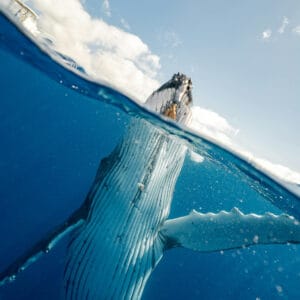
The Surprising Grandeur of Grass
“At this time of year when lawns across the nation are largely dormant, grass may not stand out as one of God’s amazing gifts to man. However, this humble group of plants deserves some special time in the spotlight.”

Soft strains from a violin, strums from a guitar, or rolls from a banjo draw us in. We pause and listen. Humans innately love music and create plenty of it, introducing new genres, new songs, and new arrangements. But nature has a few songs of its own. Let’s slow down for a closer look at the music with which God gifted His creations.
Step outside anywhere in the world (save a few smoggy cities or volcanic sites), and what will you hear? Birds singing. From short chirps to whole phrases, these small creatures have more musical variety than an orchestra. How do they do that?

While song birds have a larynx (or vocal cords), they actually don’t use it for singing. At the end of the trachea sits the syrinx. This is what these birds use to produce their trills. The right and left muscles of the syrinx can function separately, producing two notes at the same time(1). Imagine if human beings could do that! Evolutionists call this an “evolutionary novelty”(2) as no other animal has this design. However, Genesis 1 tells us God created all flying creatures on day 5 and 1 Corinthians 15 lists birds as a creature distinct from any other type of flesh, thus contradicting the evolutionary theory of common descent. Seems the Lord just wanted to do something different when He created the cheerful song bird.
Hop on a plane or into a car and travel to Pottstown, Pennsylvania, to hear nature’s “rock music”. It’s not the only place where rocks ring; there are several sites in the US and world where rocks produce a note when struck with a hammer. Artists have come to Pottstown and created songs using only these musical rocks. Different shapes have different notes; here and there lie a few rocks that won’t ring at all. Theories have been proposed as to what causes the metallic bell-like noise: the elements of the rocks, the shapes, and sizes. None, as of yet, have proved satisfactory. It is a mystery, but it is a very pretty one.
 Deep in the watery world of the ocean, whales utter eerie moans, clicks and whistles. These communication devices have been a subject of study for some time. But more intriguing than whale Morse code are their songs. The humpback whale holds the record for the longest song, thirty minutes in length and sung over and over for up to twenty-four hours without a break. The blue whale takes the long distance medal, his tunes being heard up to 2,500 miles away. These songs change over time, suggesting that they are learned rather than instinctual. They are primarily communication devices between male and female whales, but scientists haven’t nailed down a purpose for every call and song. Some whales compose intricate songs unique to them. Others join a general chant. Like a classical piece, whale songs often include themes or repeat certain parts of the melody.(3) Perhaps the humpback whale is the Handel of the sea.
Deep in the watery world of the ocean, whales utter eerie moans, clicks and whistles. These communication devices have been a subject of study for some time. But more intriguing than whale Morse code are their songs. The humpback whale holds the record for the longest song, thirty minutes in length and sung over and over for up to twenty-four hours without a break. The blue whale takes the long distance medal, his tunes being heard up to 2,500 miles away. These songs change over time, suggesting that they are learned rather than instinctual. They are primarily communication devices between male and female whales, but scientists haven’t nailed down a purpose for every call and song. Some whales compose intricate songs unique to them. Others join a general chant. Like a classical piece, whale songs often include themes or repeat certain parts of the melody.(3) Perhaps the humpback whale is the Handel of the sea.
We are not birds, rocks, or fish. We learn of their design and their songs, and we marvel. Let us not forget that we, too, have vocal cords designed to trill; we, too, have a song to sing. As we stand in awe of the mighty design of our God, let us lift our voices, joining the mighty chorus of praise to the King.
“This is my Father’s world, And to my list’ning ears All nature sings, and ‘round me rings The music of the spheres. This is my Father’s world: I rest me in the thought Of rocks, and trees, of skies, and seas – His hands the wonders wrought.”
Maltbie D. Babcock Tweet
Notes
(1) www.scienceabc.com/nature/animals/how-and-why-do-birds-sing.html
(2) www.science.org/content/article/bird-voice-box-one-kind-animal-kingdom
(3) www.americanoceans.org/facts/why-do-whales-sing/

“At this time of year when lawns across the nation are largely dormant, grass may not stand out as one of God’s amazing gifts to man. However, this humble group of plants deserves some special time in the spotlight.”

2025 was a great year for the Creation Experience Museum! Here are some exciting words about our vision for the ministry in 2026!

“Evidence. People say they will believe something if there is enough evidence. But on certain subjects many have a priori already made up their minds and are unwilling to change.”

Christmas in Branson, Missouri Light Displays, Family Attractions, and a Free Dinosaur Experience If you’re dreaming of a classic Ozark Mountain Christmas, put Branson, Missouri
